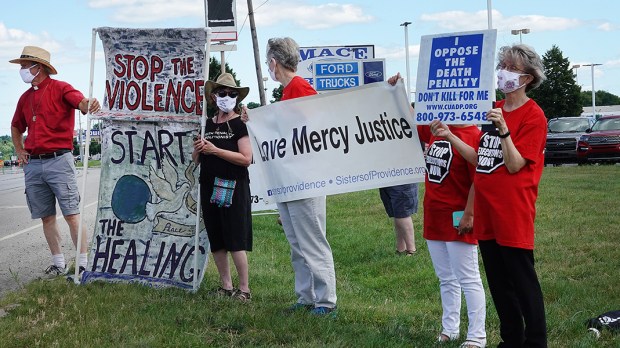A new report from an anti-capital punishment organization has joined its voice with the U.S. Catholic bishops in denouncing a “spree” of federal executions, which does not have precedent in recent history.
The execution of 10 inmates convicted of federal crimes represented a “spree of federal executions without parallel in the 20th or 21st centuries,” the report laments. “For the first time in the history of the country, the federal government conducted more civilian executions than all of the states of the union combined.”
The report from the Death Penalty Information Center, released Wednesday, came days after two bishops who chair committees of the the U.S. Conference of Catholic Bishops’ (USCCB) called on the Trump Administration to “recall God’s mercy during Advent.”
“We’ve asked many times to stop the federal executions. In fact, last Advent, three bishops wrote that the resumption of federal executions was at odds with this season of anticipated redemption,” Archbishops Paul S. Coakley of Oklahoma City and Joseph F. Naumann of Kansas City in Kansas, said in a December 7 statement. “But the executions resumed. Eight since July. Two more this week. Three in January. A new regulation will permit federal execution by means other than lethal injection, such as the electric chair.”
Archbishops Coakley and Naumann are chairmen of the USCCB’s Committee on Domestic Justice and Human Development and Committee on Pro-Life Activities, respectively.
“What does the birth of our Lord say to this?” the statement asked. “The Lord comes not to destroy, but to save. For the Second Sunday of Advent, we hear St. Peter counsel that the Lord ‘is patient with you, not wishing that any should perish but that all should come to repentance’ (2 Pt. 3:9). Can we follow the Lord’s example?
“We are all sinners. Some have done terrible things. Victims need help. Justice is needed for peace. But executions solve nothing.
“This Advent, the Lord comes to love us even though we don’t deserve it,” the statement concluded. “Let us repent and embrace his gift. We call on President Trump and Attorney General Barr, in recognition of God’s unmerited gift of self-giving love: stop these executions.”
Hopeful signs
In spite of the federal executions, the Death Penalty Information Center found plenty of positive signs for their cause in 2020. On the state level, there were fewer executions carried out than in any year in nearly three decades.
With Colorado becoming the 22nd state to abolish capital punishment, the DPIC report says, by year’s end, more states had abolished the death penalty or gone 10 years without an execution. In addition, more counties elected prosecutors who pledged never to seek the death penalty or to use it more sparingly, and fewer new death sentences were imposed than in any prior year since the Supreme Court struck down U.S. death penalty laws in 1972.
Acknowledging that court closures due to the coronavirus pandemic contributed to a low numbers of death sentences and executions, the report notes that even before the pandemic, death sentences and executions in the first quarter of the year “put the United States on pace for a sixth consecutive year of 50 or fewer new death sentences and 30 or fewer executions.”
Including the federal executions, there were only 17 death sentences carried out in 2020.
Public opinion, too, has reflected headway for the anti-death penalty cause, the report says: a Gallup poll showed public support for capital punishment at near a half-century low.
Problems persist
But problems persist in the use of capital punishment, according to the Death Penalty Information Center, a national non-profit organization serving the media and the public with analysis and information on issues concerning capital punishment. Their report points out that executions and new death sentences in 2020 “continued to be directed at defendants and prisoners who were the most vulnerable or who had the most defective court process.” It says in the report that every prisoner executed in 2020 had one or more significant mental or emotional impairments (mental illness, intellectual disability, brain damage, or chronic trauma) or was under age 21 at the time of the crime for which he was executed.
“The executed included several prisoners whose more culpable co-defendants received lesser sentences, a prisoner who was denied potentially exculpatory DNA testing, and prisoners whose executions were opposed by victims’ families,” says the report. “Of those who were sentenced to death this year, more than 20% waived key procedural rights, including their rights to counsel and/or a jury trial, and three strenuously proclaimed their innocence.”
On the bright side, five prisoners were exonerated from death row in 2020. But in each case, misconduct on the part of prosecutors had contributed to the wrongful conviction, the report claims.

